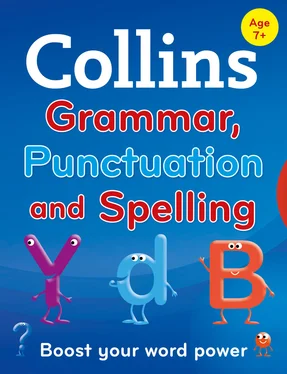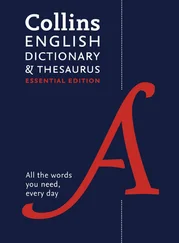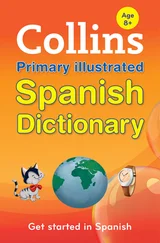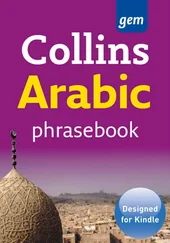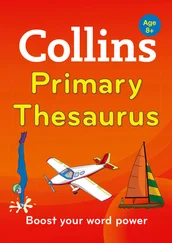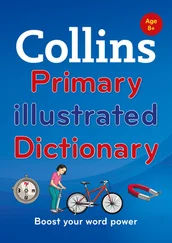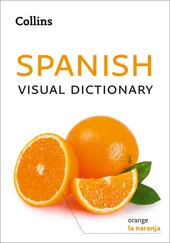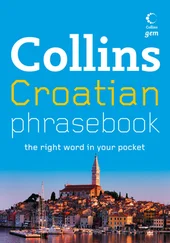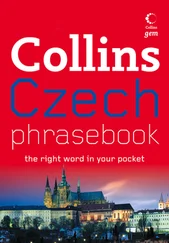Do you like jazz? I don’t like it.
> Do you like jazz? I don’t.
Julie looked behind and she started to run.
> Julie looked behind and started to run.
Ellipsis is also the name of a punctuation mark. You can see more about this on page 58.
Ambiguity
Ambiguity is when something is not clear and could confuse the reader. For example:
The dog bit the man and he barked.
Who barked? The man or the dog?
The dog bit the man and then barked.
By removing the pronoun he and adding the adverb then, you get rid of the ambiguity.
Avoiding repetition
You use pronouns to avoid repeating nouns in a piece of writing.
My aunt lives in Rome. My aunt has lived there for twenty years. My aunt works as a translator.
> My aunt lives in Rome. She has lived there for twenty years. She works as a translator.
Expressing possibility
You can express the idea of possibility or uncertainty in two ways.
Modal verbs
You can use verbs like may, might, could and should to show that something is not certain.
We may be getting a puppy.
I might not be here when you get home.
The team could be moving to a new stadium.
Robert should be able to meet you at the station.
Adverbs
You can also use certain adverbs to show that something is not definite.
Maybe we can go next week.
Perhaps you can help me with this?
She is possibly too late to join the class now.
Types of English
The way you talk to your friends is not the same way that you talk to your head teacher. We write and speak in different ways, depending on the situation.
Informal language
This is how you write to friends or close family, for example in emails or texts:
Hey how R U? Soz i missed ur call. @ lazergame with jack n anna. It was beast! cant wait 2 go again. I’ll phone u l8r. ☺
Some features of informal language:
• slang words (beast)
• contracted forms (I’ll)
• abbreviations (R U, soz, ur, n)
• smileys or emoticons (☺)
• lack of punctuation (jack, anna, cant, i)
• informal greeting (Hey)
• short simple sentences
• simple vocabulary
• numbers or symbols (2 for to, @ for at or l8r for later)
Question tags
A question tag is a short question at the end of a statement. They are used to check that the listener agrees with the speaker. They are common in speech and informal writing but you should not use them in formal writing:
You’ve cleaned your room, haven’t you?
We’re not going to that, are we?
Formal language
This is the language you should use when you are writing things for school.
Dear Mrs Jenkins
I am sorry I missed your telephone call yesterday. I was out with two of my friends, Jack and Anna. We were at an attraction called Lazergame, where you chase and shoot each other with lasers. It was really good fun and I am hoping to go again soon.
I will see you at five o’clock on Friday, assuming your train is on time.
Yours sincerely, Eve
Some of the features of formal language:
• full forms (I am, you are, I will)
• use of capital letters (I, Lazergame, Jack, Anna)
• no slang (sorry not soz)
• longer, more complex sentences
• formal opening and closing (Dear, Yours sincerely)
• more difficult words (attraction, assuming)
• not using symbols instead of words
Formal and informal vocabulary
You should avoid informal and slang words in your written work, unless you are writing conversation. For example, use:
child (not kid)
man (not guy)
friend (not pal)
satisfactory (not OK)
angry (not ballistic)
wealthy (not minted)
relax (not chill)
impressive (not awesome)
very good (not well good)
Subjunctive
Another feature of formal language is the subjunctive. This is a form of verb that is sometimes used to show the possibility of something happening or the wish for it to happen. You use were instead of was:
If your father were here he would help you.
If I were rich I would buy a house like that.
Susan has always wished she were taller.
I wouldn’t do that if I were you.
Standard English and Non-standard English
Standard English is the form that you learn to read and write in school. It is the language that you read in newspapers and books, and hear on the television and radio news. It obeys the rules of English grammar and can be spoken in any accent. You should use this for anything you write in school and in official letters and emails. Non-standard English is the language that people often speak, where they don’t always follow the rules of grammar. You should avoid using this in writing.
Tense agreement
You must make sure that you do not jump between tenses when you are writing. If you start off in the past tense, keep to the past tense.
I was walking down the street when I saw my friend coming towards me.
(NOT I was walking down the street when I see my friend coming towards me.)
Subject and verb agreement
You must use the correct form of the verb for the subject of the sentence.
He was asleep when the fire broke out.
(NOT He were asleep when the fire broke out.)
We were happy to hear the news. (NOT We was happy to hear the news.)
Verb inflections
You must use the correct verb form for the past tense of irregular verbs. Some verbs (irregular verbs) have two different forms for the past tense, for example see. These are called the past tense and the past participle. The past tense is the one that makes the simple past of the verb. The past participle is the one you use with have.
I saw = the past tense
I have seen = the past participle
I saw him yesterday. (NOT I seen him yesterday.)
You should have gone to bed earlier. (NOT You should have went to bed earlier.)
He did his homework in school. (NOT He done his homework in school.)
Also, you should write I was sitting not I was sat:
I was sitting on the wall when Zain appeared.
(NOT I was sat on the wall when Zain appeared.)
Verb contractions
Some shortened forms of verbs are used in non-standard English. You should not use them in your writing:
| • ain’t = am not, are not, is not |
|
He is not here yet. (NOT He ain’t here yet.) |
|
|
|
| • amn’t = am not |
|
I am not going. (NOT I amn’t going.) |
|
|
|
| • shouldnt’ve = should not have |
|
You should not have done that. (NOT You shouldnt’ve done that.) |
|
|
|
| • innit = is it not? |
|
|
I and me
You must not confuse I and me. You use I for the subject of the sentence, and me for the object.
Helen and I are going swimming. (NOT Helen and me are going swimming.)
Kevin threw the water balloon at Linda and me.
(NOT Kevin threw the water balloon at Linda and I.)
If you are not sure whether to use I or me in a sentence like this, take the other person out of the sentence and see if it still makes sense:
Helen and I are going swimming.
> I am going swimming. (NOT Me is going swimming.)
Kevin threw the water balloon at Linda and me.
> Kevin threw the water balloon at me. (NOT Kevin threw the water balloon at I.)
Double negatives
A negative is a word like not, nor, never or nothing, which means no. Sometimes people use two of these in a sentence and this is known as a double negative. You should not do this in standard English:
I didn’t have any money.
(NOT I didn’t have no money.)
Читать дальше
